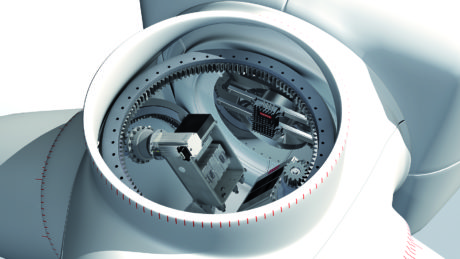Moog’s new pitch control system improves wind turbine reliability by up to three times over existing systems.

The Industrial Group of Moog Inc. launched its next generation pitch technology – the Moog Pitch System 3. The first shipment of Moog Pitch System 3 is now in operation at a wind farm in Brazil, and Moog officially unveiled the system at the WindEnergy Hamburg Expo, last September 2016.
The new pitch system was developed to meet the growing need for wind farm operators and turbine manufacturers to reduce wind farm capital and operating expenses (CAPEX and OPEX).

«The design of the new pitch system reduces the Levelized Cost of Energy (LCoE) by increasing wind turbine reliability and minimizing downtime,» says Dennis Webster, general manager for the Wind Business Unit of the Industrial Group of Moog Inc.
Levelized Cost of Energy measures the net cost to install and operate a wind turbine against expected energy output over the course of the turbine’s lifetime. There are a number of factors that contribute to LCoE, one of the most important of which is turbine reliability. Several industry research findings[1] identify the pitch system as the No. 1-ranked component contributing to wind turbine failure and downtime. Pitch systems are exposed to harsh ambient conditions inside the rotating hub, including extreme temperature, humidity, and vibration leading to lower reliability compared to other turbine components. Though pitch systems represent less than 3 percent of wind farm CAPEX costs, they account for nearly a quarter of all downtime in turbines.
A highly integrated and optimized architecture

Most pitch systems used throughout the industry today consist of as many as 2,000 to 3,000 subcomponents depending on the manufacturer. With a highly integrated and optimized architecture that consists of significantly fewer parts, the Moog Pitch System 3 is up to three times more reliable than the industry’s standard pitch systems. This leads to a reduction in both turbine downtime as well as scheduled and unscheduled maintenance activities.
Francesco Vanni, Senior Engineer, Asset Integrity & Performance, DNV GL – Energy, says «We benchmarked the reliability of existing pitch systems based on operational data from the industry and compared it with the reliability numbers provided by Moog for their new Pitch System 3. Our cost of energy model suggests that reliability improvements expected for the Moog Pitch System 3 could save up to $1.70/MWh for a typical 3.0MW turbine, a significant reduction in LCoE.»
By reducing failures and downtime caused by overly complex pitch systems, the Moog Pitch System 3 improves productivity and ultimately enables wind farm operators and OEMs to be more competitive in today’s increasingly complex global energy landscape. The new pitch system is already available to turbine manufacturers in Europe and Asia.
For more information, please visit www.moog.com/wind



